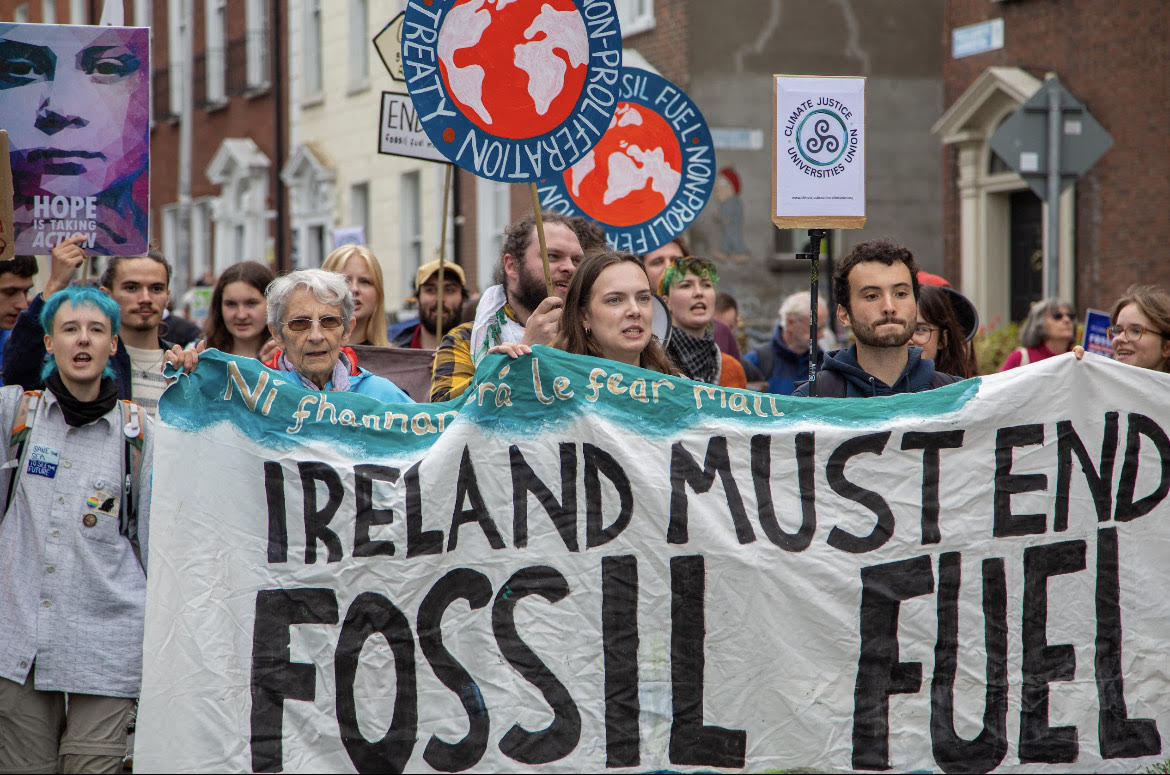Approximately 100 protestors marched from the Garden of Remembrance to Leinster House on Friday the 20th of September, calling on the Irish government to endorse the Fossil Fuel Non-Proliferation Treaty and equitably phase out the use of fossil fuels.
The protestors marched across the Liffey, through the city centre, and by Trinity’s gates as the Gardaí stopped traffic to facilitate their route. They chanted, “Simon Harris, shut your gob, sign the treaty, do your job” and “No more coal, no more oil, keep that carbon in the soil”.
At Leinster House, sixteen-year-old Flossie Donnelly was the first of six speakers and spoke defiantly and at times, mournfully, about coming of age in a time of climate crisis. In 2019, it struck her that she had “no power, no voice”. Five years later, she feels like little has changed: Ireland currently has no phase out date for the use of oil and gas, even as climate crisis effects like rising energy costs and flooding have already wreaked havoc.
The speakers ranged across age, nationality, and topic, from Maxwell Atuhura, a Ugandan climate activist fighting the East African Crude Oil Pipeline, to Eddie Mitchell, a Leitrim councillor who called for banning fracking and the Shannon liquified natural gas receiving terminal in Ireland. Speaker Jessica Dunne spoke about the intersectionality of climate justice and Palestinian solidarity, leading chants of “From the river to the sea, Palestine will be free”. The speakers spoke passionately about the responsibility of the global North as well as the ties between imperialism, capitalism, and fossil fuels.
As explained in part by speaker Dearbhla Richardson, the fossil fuel non-proliferation treaty is backed by thirteen nation-states, including Fiji, Colombia, and Timor-Leste, as well as the World Health Organization and the European Parliament. 118 cities and subnational governments have also endorsed it, including Ireland’s very own councils of Cork City, Dún Laoghaire-Rathdown, Fingal County, and South Dublin County. The treaty seeks to accelerate the global transition to renewable energy, as governments worldwide continually overshoot the carbon emission limit required to fulfil the 2016 Paris Agreement’s goal of staying under 1.5 degrees celsius of warming.
At a protest that has often focused on galvanising youth, the crowd consisted of all ages, from university students to grandparents. The final speaker was Saoi O’Connor, the prominent youth climate activist from Skibbereen who began the Fridays for Future strikes in Cork in 2019. They called for governmental transparency and action after years of failed promises. “Let me tell you what I’ve learned in the last five years”, O’Connor cried, ‘every commitment, every target, every net-zero strategy, is a lie. It is a scam to make us shut up… But we will not accept it. We will make the ground shake under their feet. We will make them agree to our terms and our treaties, by the people and for the people. We say no more coal, no more oil’.
Despite taking place right outside Trinity’s campus, student turnout was low. In a short interview after the protest with The University Times, O’Connor had a message for them: “So many social movements throughout history, especially radical social movements… have been led by students and young people. That’s what we should be doing here. We should be organising ourselves to build stronger movements on the streets, in our communities, and building resistance to fossil fuels, to imperialism, to the U.S. military in Shannon. We must recognize the interconnectedness of those issues.”







